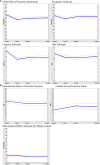Quality of life and function after rectal cancer surgery with and without sphincter preservation
- PMID: 36353560
- PMCID: PMC9639454
- DOI: 10.3389/fonc.2022.944843
Quality of life and function after rectal cancer surgery with and without sphincter preservation
Abstract
Despite improvements in surgical techniques, functional outcomes and quality of life after therapy for rectal cancer remain suboptimal. We sought to prospectively evaluate the effect of bowel, bladder, and sexual functional outcomes on health-related quality of life (QOL) in patients with restorative versus non-restorative resections after rectal cancer surgery. A cohort of 211 patients with clinical stage I-III rectal cancer who underwent open surgery between 2006 and 2009 at Memorial Sloan Kettering were included. Subjects were asked to complete surveys preoperatively and at 6, 12, and 24 months after surgery. Validated instruments were used to measure QOL, bowel, bladder, and sexual function. Univariable and multivariable regression analyses evaluated predictors of 24- month QOL. In addition, longitudinal trends over the study period were evaluated using repeated measures models. In total, 180 patients (85%) completed at least 1 survey, and response rates at each time point were high (>70%). QOL was most impaired at 6 and 12 months and returned to baseline levels at 24 months. Among patients who underwent sphincter-preserving surgery (SPS; n=153 [85%]), overall bowel function at 24 months was significantly impaired and never returned to baseline. There were no differences in QOL at 24 months between patients who underwent SPS and those who did not (p=.29). Bowel function was correlated with QOL at 24 months (Pearson correlation,.41; p<.001). QOL among patients who have undergone SPS for rectal cancer is good despite poor function. Patients with ostomies are able to adjust to the functional changes and, overall, have good global QOL. Patients with low anastomoses had lower global QOL at 24 months than patients with permanent stomas. Our findings can help patients set expectations about function and quality of life after surgery for rectal cancer with and without a permanent stoma.
Keywords: LARS – low anterior resektion syndrom; MSKCC = memorial sloan–kettering cancer center; patient reported clinical outcomes; quality of Life; rectal cancer.
Copyright © 2022 Pappou, Temple, Patil, Smith, Wei, Nash, Guillem, Widmar, Weiser, Paty, Schrag and Garcia-Aguilar.
Conflict of interest statement
EP : Travel, Accommodations, Expenses: Intuitive Surgical SP: Consulting or Advisory Role: ByHeart LT: https://openpaymentsdata.cms.gov/physician/631475 IW: https://openpaymentsdata.cms.gov/physician/643564 JS: Consulting or Advisory Role: Guardant Health MWi: Consulting or Advisory Role: Precisca Research Funding: Clinical Genomics Patents, Royalties, Other Intellectual Property: UpToDate Section Editor GN: Open Payments Link: https://openpaymentsdata.cms.gov/physician/851428 José GG: Employment: Intuitive Surgical Honoraria: Intuitive Surgical, Myriad Genetics Speakers' Bureau: Intuitive Surgical MWe: Employment: BridgeBio (I) Stock and Other Ownership Interests: BridgeBio PP: https://openpaymentsdata.cms.gov/physician/662365 DS: https://openpaymentsdata.cms.gov/physician/389395 JG-A: Stock and Other Ownership Interests: Intuitive Surgical Consulting or Advisory Role: Medtronic, Intuitive Surgical, Johnson & Johnson The remaining author declares that the research was conducted in the absence of any commercial or financial relationships that could be construed as a potential conflict of interest.
Figures





References
Grants and funding
LinkOut - more resources
Full Text Sources

